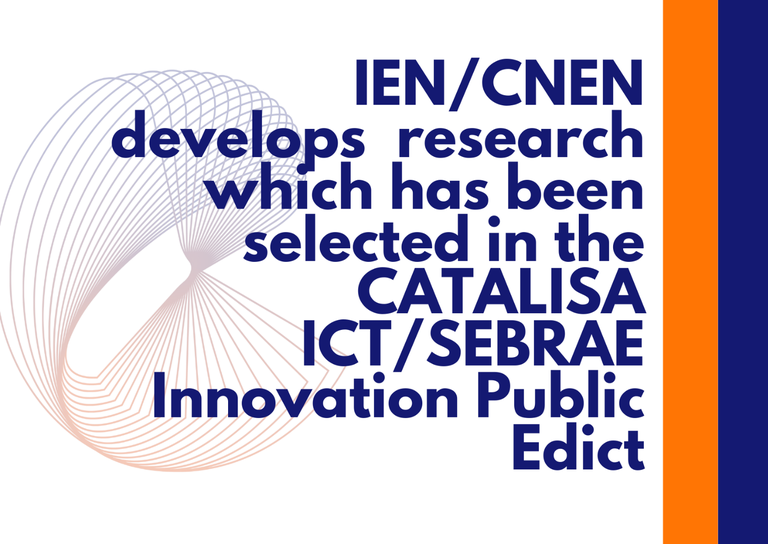Notícias
IEN/CNEN develops research which has been selected in the CATALISA ICT/SEBRAE Innovation Public Edict

The project entitled “Natural polymers in radioiodine administration”, coordinated by the researcher, Luciana Carvalheira, from the Argonaut Reactor Service (SEREA), has been selected on its initial phase “Grow and Structure” of the Catalisa ICT – Plans of innovation, whose purpose is to increase and promote technological projects which provide both technological and innovative solutions to the national and international market. The research has been developed with the support of FINEP´s project resources, in partnership with the Polymerization Engineering Laboratory (EngePol), from COPPE/UFRJ.
Radioiodine is an important input of nuclear medicine which has been widely using for more than 300 diagnostic and therapeutic procedures annually and whose main application is in the diagnosis and therapy of thyroid cancer. According to INCA, about 13.780 new cases of thyroid cancer are recorded annually; among which roughly 86% affect Brazilian women. Nowadays, the administration of radioiodine is applied orally through its dilution in serum to be ingested by the patient. During the focused procedure, about 10 a 20% of this dose is lost because of the contamination of the items both bottles and straws. In addition, it is necessary to submit the patient to a relatively larger dose to balance losses that happen during the procedure, owing to other organs of the digestive system involuntarily retain radioiodine activity, even before it reaches the patient`s stomach.
 The objective of the research is the encapsulation of radioiodine in nanoparticles of natural polymers in the sense that the release of the radioactive material only occurs in the stomach environment. In the light of this fact, the researcher Luciana points out: “The encapsulation of radioiodine in nanoparticles of biopolymers in order to release only inside the patient´s stomach is undoubtedly a viable innovative solution with great advantages, because it not only diminishes the losses of contamination but also improves the dose accuracy of radiation to patients who are exposed. This technological solution both results in an increase of the availability of this radioisotope to the population and ensures safe conditions for those who are supposed to handle it,
besides diminishing costs with decontamination and also decreasing the high environmental impact; due to the reduction of radioactive waste.”
The objective of the research is the encapsulation of radioiodine in nanoparticles of natural polymers in the sense that the release of the radioactive material only occurs in the stomach environment. In the light of this fact, the researcher Luciana points out: “The encapsulation of radioiodine in nanoparticles of biopolymers in order to release only inside the patient´s stomach is undoubtedly a viable innovative solution with great advantages, because it not only diminishes the losses of contamination but also improves the dose accuracy of radiation to patients who are exposed. This technological solution both results in an increase of the availability of this radioisotope to the population and ensures safe conditions for those who are supposed to handle it,
besides diminishing costs with decontamination and also decreasing the high environmental impact; due to the reduction of radioactive waste.”
| On the left, the microparticles of the biopolymer studied |
During this phase, the selected projects are awarded with a financial support up to R$ 150,000, in the complete forms of either assistances or scholarships to be shared among all participants, over up 12 months. The researcher Luciana Carvalheira leads an entirely female team who are always available to her and she is pleased to introduce: Kethele Loureiro (IC/IEN), a graduate student in Chemical Engineering at the Polytechnic School of UFRJ, Nicolis Amaral de Araujo (DTI/IEN), a DSc student in Chemical Engineering at the Chemical Engineering Program of COPPE/UFRJ, and Larissa Cunha Pinheiro, a DSc student in Nuclear Engineering at the Nuclear Engineering Program of COPPE/UFRJ. Likewise during the development of the research, the project will provide training so as to achieve the feasible engagement for masters and doctors in the innovation and entrepreneurship ecosystem; and an additional essential support to create a technology-based company with the developed solution will be considered.